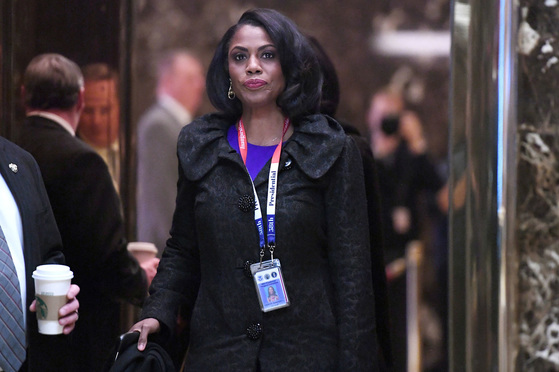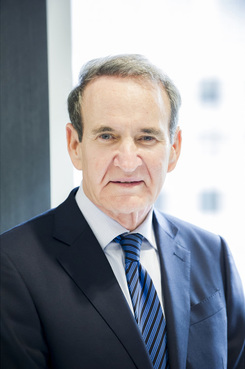Omarosa-Trump Tapes Could Mean 'Open Season on Privacy Rights' in the Workplace, Attorneys Say
Lawyers from across the country shared their responses to the tapes, and what they demonstrate about how privacy laws play out across states.
August 15, 2018 at 10:29 AM
5 minute read
 Omarosa Manigault, former director of African American outreach for President Donald Trump, arrives in the lobby of Trump Tower in New York, on Jan. 16, 2017. Photo: Anthony Behar/Bloomberg.
Omarosa Manigault, former director of African American outreach for President Donald Trump, arrives in the lobby of Trump Tower in New York, on Jan. 16, 2017. Photo: Anthony Behar/Bloomberg.
Former White House aide Omarosa Manigault Newman has angered her former boss by revealing she secretly recorded their conversations, but attorneys watching the White House say other employees could learn from the drama playing out on the national stage.
Aaron Tandy, a partner at Pathman Lewis in Miami, is licensed to practice in Florida and New York. He said employers can try, but they likely won't be able to restrict tape recordings in today's climate.
“It is possible in this day and age that recordings at the workplace will be made and will be used,” Tandy said.
Manigault Newman, also known for her appearance on President Donald Trump's former reality television show, the Celebrity Apprentice, released a recording allegedly depicting her firing by White House Chief of Staff John Kelly. She also alluded to the existence of tape recordings in which Trump allegedly used the N-word while filming the Apprentice.
Trump tweeted in response, “I don't have that word in my vocabulary and never have. She made it up.” He later called Manigault Newman a “dog” and lamented hiring her for his White House team. His campaign then reported it filed arbitration action against Manigault Newman for allegedly breaching a 2016 confidentiality agreement.
“I'm stunned, not only by her recording, but by credible reports that many people in the White House are recording conversations,” John Thomas, professor of law at Quinnipiac University in Hamden, Connecticut, said. “It must be really difficult to engage in serious policy discussions if you suspect that one party, or maybe more, are recording it for whatever reasons.”
But attorneys say employers should remember that under federal law, and in most states in the U.S., recordings like this can be made without disclosure.
“What's different today is that recording devices are everywhere, whereas they didn't used to be,” said Ed Ellis, a Philadelphia shareholder and co-chairman of the Whistleblowing and Corporate Ethics Practice Group at Littler Mendelson. ”And the quality of the recording is way better than it used to be.”
'People You Think You Trust Might Be Recording'
In one-party consent states, where only one person in a conversation needs to know a recording is being made, it's important to tread carefully, warned Kendall Coffey, former U.S.Attorney for the Southern District of Florida.
 Kendall Coffey.
Kendall Coffey.“It can be open season on privacy rights, because the law allows a single party to unilaterally determine whether a conversation is going to be captured on tape,” said Coffey, of Coffey Burlington in Miami. “There's precious little that can be done to prevent that tape from being posted on YouTube.”
Even in two-party consent states, the issue hinges on whether there is a “reasonable expectation of privacy” in a conversation.
“While Florida does protect phone conversations and face-to-face conversations, what's less clear is the extent of protection when you go outside the home,” Coffey said. “There is some important decisional language suggesting that you have to look at the specific circumstances of conversations in an office or work environment.”
For instance, under some states' wiretapping statutes, a recording taken from the middle of a busy lunchroom is different from one made in a private office setting.
“If you're going to have a candid conversation, you need to be in an environment that strongly signals privacy,” Coffey said. “You need to be aware of the fact that people you think you trust might be recording your comments. If you're talking to someone that you think is a friend, and are making unfiltered comments, they could come back to haunt you.”
D.C.'s one-party statute shields Manigault Newman from certain legal claims that could have been brought if she had recorded the conversations in any of 12 states, including Florida, California, Connecticut and Illinois, that require consent.
“It may violate some White House rule, but I don't think it violates the statute,” said Ellis, a litigator who defends employers in whistleblower actions, noncompete matters, trade secret litigation and age, race, sex and disability lawsuits. ”If you're an employer and going to have a conversation with somebody having to do with discipline, termination, that sort of thing, you can get recorded. You've got to choose your words carefully.”
Former journalist Dwayne A. Robinson, now a commercial litigator with Kozyak Tropin & Throckmorton in Miami, has a simple rule.
“I was told that if you didn't want to see something on the front of a newspaper, don't send it out in an email,” he said.
Robinson said it's crucial for employers to enforce strong policies that tell staff what they can and cannot record in the workplace.
“We do have some semblance of control as professionals in our own sphere, in our own realm, and we can choose to enforce those rules or not enforce them,” he said.
But his best advice following the White House scandal? Proceed with caution.
“You have to assume that there's always a microphone on,” Robinson said. “You have to assume that there's always a cellphone recording, and you have to assume that someone is always listening.”
Meanwhile, Mark Dubois, attorney with Geraghty & Bonnano in New London, Connecticut, acknowledges the issue is ”complicated.”
Dubois, who is co-author of a book on legal ethics, said, “I do not think even the White House has figured it out yet.”
Amanda Bronstad, Robert Storace and Zach Schlein contributed to this report.
This content has been archived. It is available through our partners, LexisNexis® and Bloomberg Law.
To view this content, please continue to their sites.
Not a Lexis Subscriber?
Subscribe Now
Not a Bloomberg Law Subscriber?
Subscribe Now
NOT FOR REPRINT
© 2025 ALM Global, LLC, All Rights Reserved. Request academic re-use from www.copyright.com. All other uses, submit a request to [email protected]. For more information visit Asset & Logo Licensing.
You Might Like
View All
Latest Boutique Combination in Florida Continues Am Law 200 Merger Activity
3 minute read
Miami-Dade Litigation Over $1.7 Million Brazilian Sugar Deal Faces Turning Point
3 minute read
Meta agrees to pay $25 million to settle lawsuit from Trump after Jan. 6 suspension
4 minute readTrending Stories
Who Got The Work
J. Brugh Lower of Gibbons has entered an appearance for industrial equipment supplier Devco Corporation in a pending trademark infringement lawsuit. The suit, accusing the defendant of selling knock-off Graco products, was filed Dec. 18 in New Jersey District Court by Rivkin Radler on behalf of Graco Inc. and Graco Minnesota. The case, assigned to U.S. District Judge Zahid N. Quraishi, is 3:24-cv-11294, Graco Inc. et al v. Devco Corporation.
Who Got The Work
Rebecca Maller-Stein and Kent A. Yalowitz of Arnold & Porter Kaye Scholer have entered their appearances for Hanaco Venture Capital and its executives, Lior Prosor and David Frankel, in a pending securities lawsuit. The action, filed on Dec. 24 in New York Southern District Court by Zell, Aron & Co. on behalf of Goldeneye Advisors, accuses the defendants of negligently and fraudulently managing the plaintiff's $1 million investment. The case, assigned to U.S. District Judge Vernon S. Broderick, is 1:24-cv-09918, Goldeneye Advisors, LLC v. Hanaco Venture Capital, Ltd. et al.
Who Got The Work
Attorneys from A&O Shearman has stepped in as defense counsel for Toronto-Dominion Bank and other defendants in a pending securities class action. The suit, filed Dec. 11 in New York Southern District Court by Bleichmar Fonti & Auld, accuses the defendants of concealing the bank's 'pervasive' deficiencies in regards to its compliance with the Bank Secrecy Act and the quality of its anti-money laundering controls. The case, assigned to U.S. District Judge Arun Subramanian, is 1:24-cv-09445, Gonzalez v. The Toronto-Dominion Bank et al.
Who Got The Work
Crown Castle International, a Pennsylvania company providing shared communications infrastructure, has turned to Luke D. Wolf of Gordon Rees Scully Mansukhani to fend off a pending breach-of-contract lawsuit. The court action, filed Nov. 25 in Michigan Eastern District Court by Hooper Hathaway PC on behalf of The Town Residences LLC, accuses Crown Castle of failing to transfer approximately $30,000 in utility payments from T-Mobile in breach of a roof-top lease and assignment agreement. The case, assigned to U.S. District Judge Susan K. Declercq, is 2:24-cv-13131, The Town Residences LLC v. T-Mobile US, Inc. et al.
Who Got The Work
Wilfred P. Coronato and Daniel M. Schwartz of McCarter & English have stepped in as defense counsel to Electrolux Home Products Inc. in a pending product liability lawsuit. The court action, filed Nov. 26 in New York Eastern District Court by Poulos Lopiccolo PC and Nagel Rice LLP on behalf of David Stern, alleges that the defendant's refrigerators’ drawers and shelving repeatedly break and fall apart within months after purchase. The case, assigned to U.S. District Judge Joan M. Azrack, is 2:24-cv-08204, Stern v. Electrolux Home Products, Inc.
Featured Firms
Law Offices of Gary Martin Hays & Associates, P.C.
(470) 294-1674
Law Offices of Mark E. Salomone
(857) 444-6468
Smith & Hassler
(713) 739-1250







